The Cambridge History of China. Vol. 12: Republican China, 1912-1949, Part 1
Подождите немного. Документ загружается.


PROBLEMS AND -ISMS 433
idea
of
mass mobilization
as a
source
of
political
and
military power.
It
need hardly
be
added that
the 'new
cultural' perspective
of the
period
before 1919 was hardly oriented
to
mass political mobilization, however
sincere
its
ultimate commitment
to
mass education.
PROBLEMS AND -ISMS
One
of
the more significant conflicts which emerged
out of
the winds
of
doctrine
of
the
May
Fourth period
was the
debate between
Hu
Shih,
Li
Ta-chao
and
others concerning
the
question
of
'problems versus -isms'.
In the textbook accounts
of
the intellectual history
of
China after the May
Fourth period, often written under Marxist inspiration,
one
finds
a
series
of debates, each leading
to the
clear victory
of one
side
and
gradually
leading by
a
progressive ascent
to
the victory
of
Marxism and then within
the Marxist camp
to a
victory
of
'true' Marxism.
A
less triumphalist view
of these debates does
not
lead
to
such confidence concerning the designa-
tion
of
clear winners
and
clear losers.
Hu Shih's articles
in
Mei-chou
p'ing-lun
(Weekly critic)
of
July
and
August 1919
on
'Problems and -isms' reflect his disturbance over the drift
of his friends Ch'en Tu-hsiu,
Li
Ta-chao
and
others into
the
communist
camp.
As he was
later
to
remark, 'Though
the
slaves
of
Confucius
and
Chu Hsi are fewer now,
a
new breed
of
slaves
of
Marx and Kropotkin has
sprung up.'
27
In
these articles Hu draws
a
sharp contrast between Dewey's
scientific approach
to
society which directs
its
attention
to
concrete situa-
tions and problem
areas,
analyses them and provides concrete solutions
for
specific problems,
on the one
hand,
and
totalistic '-isms' which claim
to
provide total and 'fundamental solutions'
for
all the problems
of
a
society
on
the
other.
As one
might have expected,
his
opponents reply that
all
the separate problems
of
a
society are related
to a
total structure
or
system
and
can be
solved fundamentally only when
the
'system'
is
changed
as a
whole.
It is
interesting
to
note that
at
this time Ch'en Tu-hsiu, who
had
not
yet
been
won
over
to the
communist camp, still tended
to
support
Hu Shih's point
of
view.
Yet Li
Ta-chao
and
many
of
the students were
yearning
to
find
in
anarchism and Marxism warrant
for
their ardent hopes
that there might indeed be a 'fundamental solution'
to
China's overwhelm-
ing problems
and
that History would lead
to
such solutions.
In
post-
1949 China,
Hu
Shih has,
of
course, been treated
as the
decisive loser
of
the debate.
One need
not be a
follower
of
John Dewey's 'scientific methodology'
27 Grieder,
Hu
Shih and the
Chinese renaissance
189, cited from
'Wo ti
ch'i-lu'
(My
crossroads),
Hu Shih tven-ts'un (Collected works
of Hu
Shih),
3.
99-102.
Cambridge Histories Online © Cambridge University Press, 2008
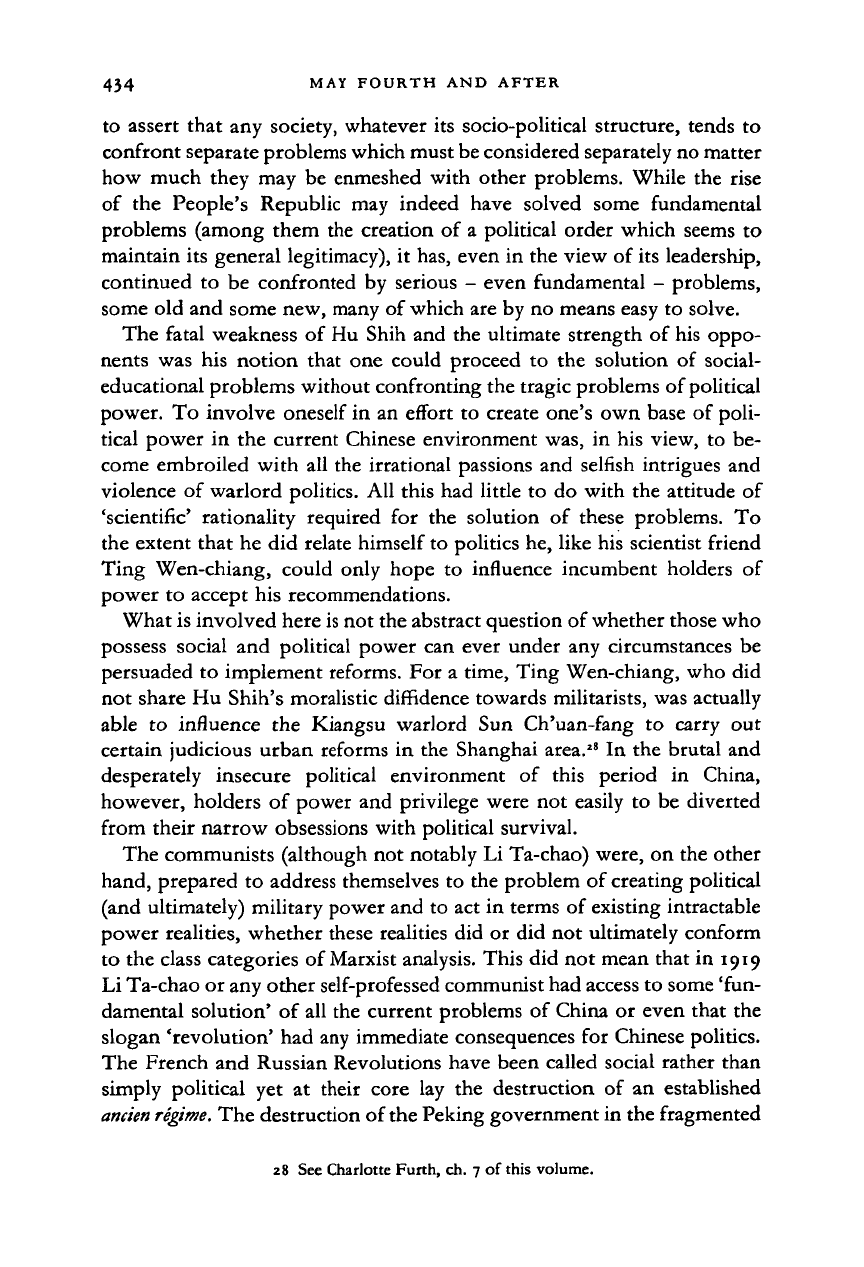
434 MAY FOURTH AND AFTER
to assert that
any
society, whatever
its
socio-political structure, tends
to
confront separate problems which must be considered separately no matter
how much they
may be
enmeshed with other problems. While
the
rise
of
the
People's Republic
may
indeed have solved some fundamental
problems (among them
the
creation
of a
political order which seems
to
maintain
its
general legitimacy),
it
has, even
in
the view
of
its leadership,
continued
to be
confronted
by
serious
-
even fundamental
-
problems,
some
old and
some new, many
of
which are
by no
means easy
to
solve.
The fatal weakness
of
Hu Shih
and the
ultimate strength
of
his oppo-
nents
was his
notion that
one
could proceed
to the
solution
of
social-
educational problems without confronting the tragic problems of political
power.
To
involve oneself
in an
effort
to
create one's
own
base
of
poli-
tical power
in the
current Chinese environment was,
in his
view,
to be-
come embroiled with
all the
irrational passions
and
selfish intrigues
and
violence
of
warlord politics.
All
this
had
little
to do
with
the
attitude
of
'scientific' rationality required
for the
solution
of
these problems.
To
the extent that
he did
relate himself to politics he, like
his
scientist friend
Ting Wen-chiang, could only hope
to
influence incumbent holders
of
power
to
accept
his
recommendations.
What is involved here is not the abstract question
of
whether those who
possess social
and
political power
can
ever under
any
circumstances
be
persuaded
to
implement reforms.
For a
time, Ting Wen-chiang, who
did
not share
Hu
Shih's moralistic diffidence towards militarists, was actually
able
to
influence
the
Kiangsu warlord
Sun
Ch'uan-fang
to
carry
out
certain judicious urban reforms
in the
Shanghai area.
28
In the
brutal
and
desperately insecure political environment
of
this period
in
China,
however, holders
of
power
and
privilege were
not
easily
to be
diverted
from their narrow obsessions with political survival.
The communists (although
not
notably
Li
Ta-chao) were,
on
the other
hand, prepared
to
address themselves
to the
problem
of
creating political
(and ultimately) military power and
to act in
terms
of
existing intractable
power realities, whether these realities
did or did not
ultimately conform
to the class categories
of
Marxist analysis. This
did not
mean that
in
1919
Li Ta-chao
or
any other self-professed communist had access
to
some 'fun-
damental solution'
of
all
the
current problems
of
China
or
even that
the
slogan 'revolution'
had
any immediate consequences
for
Chinese politics.
The French
and
Russian Revolutions have been called social rather than
simply political
yet at
their core
lay the
destruction
of an
established
ancien
regime.
The destruction
of
the Peking government in the fragmented
28
See
Charlotte Furth,
ch. 7 of
this volume.
Cambridge Histories Online © Cambridge University Press, 2008

THE THEME
OF
POPULAR CULTURE
435
China
of
1919 would have had little consequence, and both Nationalists
and Communists were
to
see their task
in
the next few years
as
that
of
dealing with
the
'problem'
of
how one constructs
the
bases
of a
new
political authority
in
China rather than
the
problem
of
destroying
an
ancien
regime.
The social could not be divorced from the political and the
political task was one
of
building
a
new political order rather than that
of destroying
a
firmly established old political order.
THE THEME OF POPULAR CULTURE
The May Fourth episode
did not
lead
to
immediate political results,
and there were many
in
the intellectual stratum including
Lu
Hsun who
were not particularly impressed with
its
significance. There were those
such as
Hu
Shih,
Ku
Chieh-kang,
Fu
Ssu-nien and others who were
to
continue
in
their belief that
the
root
of
China's problem was cultural,
and they must therefore 'reorganize the national heritage'.
One
new
tendency within this enterprise
was the
emergence
of a
positive attitude towards
the
study
of
popular culture. Even
Hu
Shih,
in his insistence that the vernacular literature
of
the past had been much
more vital and alive than the sterile 'classical' works
of
the high culture,
had introduced
a
kind
of
populist theme into
his
outlook.
He
seemed
willing
to
include the 'vernacular literature'
of
the past among the 'con-
genial stocks' to be preserved. None of this would involve interest in any
aspect of the religious culture of the masses. Yet the theme of the greater
vitality of popular culture led him to encourage Ku Chieh-kang and others
in their efforts .to explore folkways
and
regional customs
and
collect
folktales and folksongs. Ku Chieh-kang had himself been touched by the
new movement which had emerged among students since 1919
to 'go
to the people' and he was able
to
relate this movement
to
his own thesis
that while intellectuals in the past had allied themselves to the old aristoc-
racy, they should now take advantage
of
their new found autonomy
as
intellectuals
to
relate themselves
to
the common people. To do this, one
would, however, have
to
study the conscious life
of
the masses
-
their
folklore, their customs
and
folksongs, always employing
the
methods
of scientific inquiry.
2
'
From
the
very outset
of
this effort there emerged
the
idea
of
using
popular forms to convey new messages of enlightenment, such as the no-
tion
of
composing popular ballads with new educational content.
In
the
case
of
Ku Chieh-kang, however, his interest
in
folksongs, temples and
29 See Schneider, Ku
Chieh-kang
and
China's rum
history,
ch.
4.
Cambridge Histories Online © Cambridge University Press, 2008
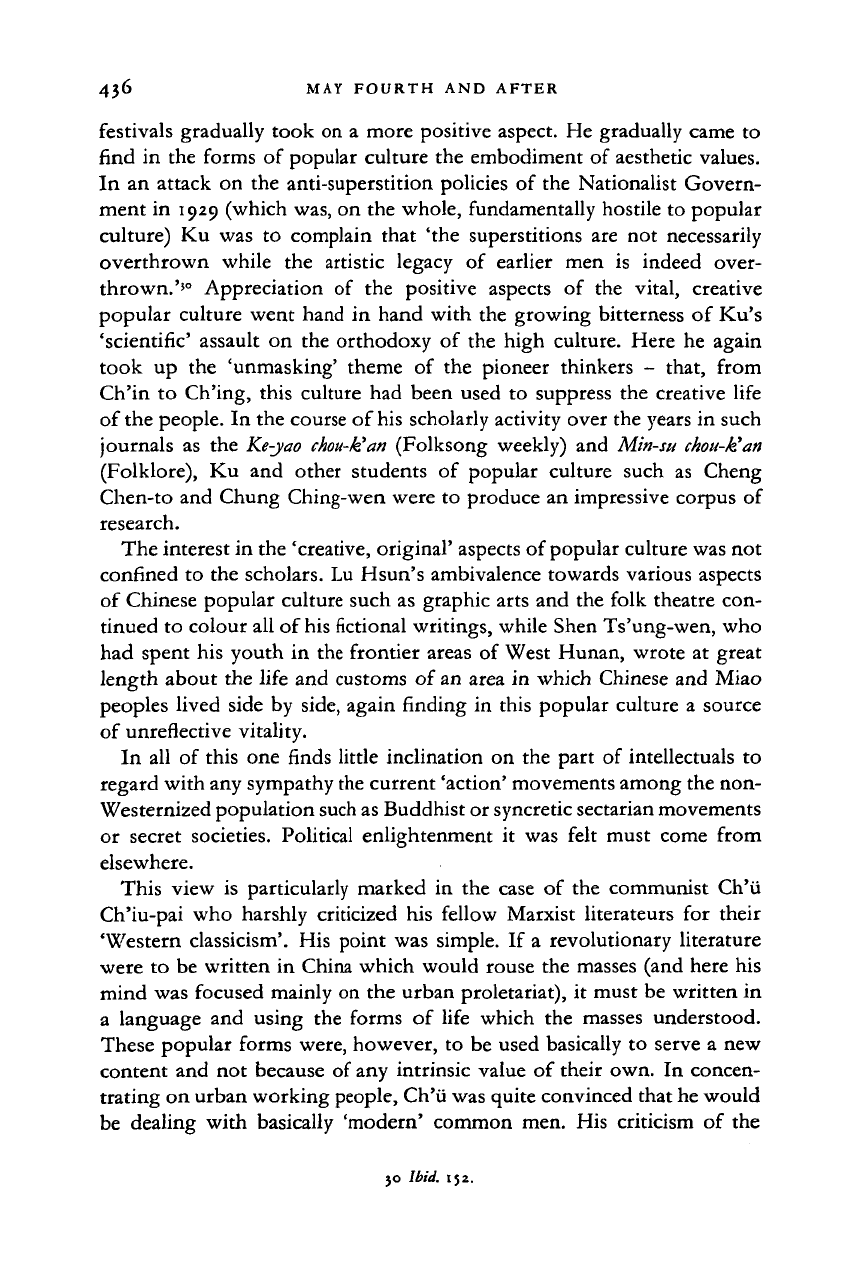
436 MAY FOURTH AND AFTER
festivals gradually took on a more positive aspect. He gradually came to
find in the forms of popular culture the embodiment of aesthetic values.
In an attack on the anti-superstition policies of the Nationalist Govern-
ment in 1929 (which was, on the whole, fundamentally hostile to popular
culture) Ku was to complain that 'the superstitions are not necessarily
overthrown while the artistic legacy of earlier men is indeed over-
thrown.''
0
Appreciation of the positive aspects of the vital, creative
popular culture went hand in hand with the growing bitterness of Ku's
'scientific' assault on the orthodoxy of the high culture. Here he again
took up the 'unmasking' theme of the pioneer thinkers - that, from
Ch'in to Ch'ing, this culture had been used to suppress the creative life
of the people. In the course of his scholarly activity over the years in such
journals as the
Ke-yao chou-k'an
(Folksong weekly) and Min-su
ckou-k'an
(Folklore), Ku and other students of popular culture such as Cheng
Chen-to and Chung Ching-wen were to produce an impressive corpus of
research.
The interest in the 'creative, original' aspects of popular culture was not
confined to the scholars. Lu Hsun's ambivalence towards various aspects
of Chinese popular culture such as graphic arts and the folk theatre con-
tinued to colour all of his fictional writings, while Shen Ts'ung-wen, who
had spent his youth in the frontier areas of West Hunan, wrote at great
length about the life and customs of an area in which Chinese and Miao
peoples lived side by side, again finding in this popular culture a source
of unreflective vitality.
In all of this one finds little inclination on the part of intellectuals to
regard with any sympathy the current 'action' movements among the non-
Westernized population such as Buddhist or syncretic sectarian movements
or secret societies. Political enlightenment it was felt must come from
elsewhere.
This view is particularly marked in the case of the communist Ch'ii
Ch'iu-pai who harshly criticized his fellow Marxist literateurs for their
'Western classicism'. His point was simple. If a revolutionary literature
were to be written in China which would rouse the masses (and here his
mind was focused mainly on the urban proletariat), it must be written in
a language and using the forms of life which the masses understood.
These popular forms were, however, to be used basically to serve a new
content and not because of any intrinsic value of their own. In concen-
trating on urban working people, Ch'ii was quite convinced that he would
be dealing with basically 'modern' common men. His criticism of the
30
Ibid.
152.
Cambridge Histories Online © Cambridge University Press, 2008
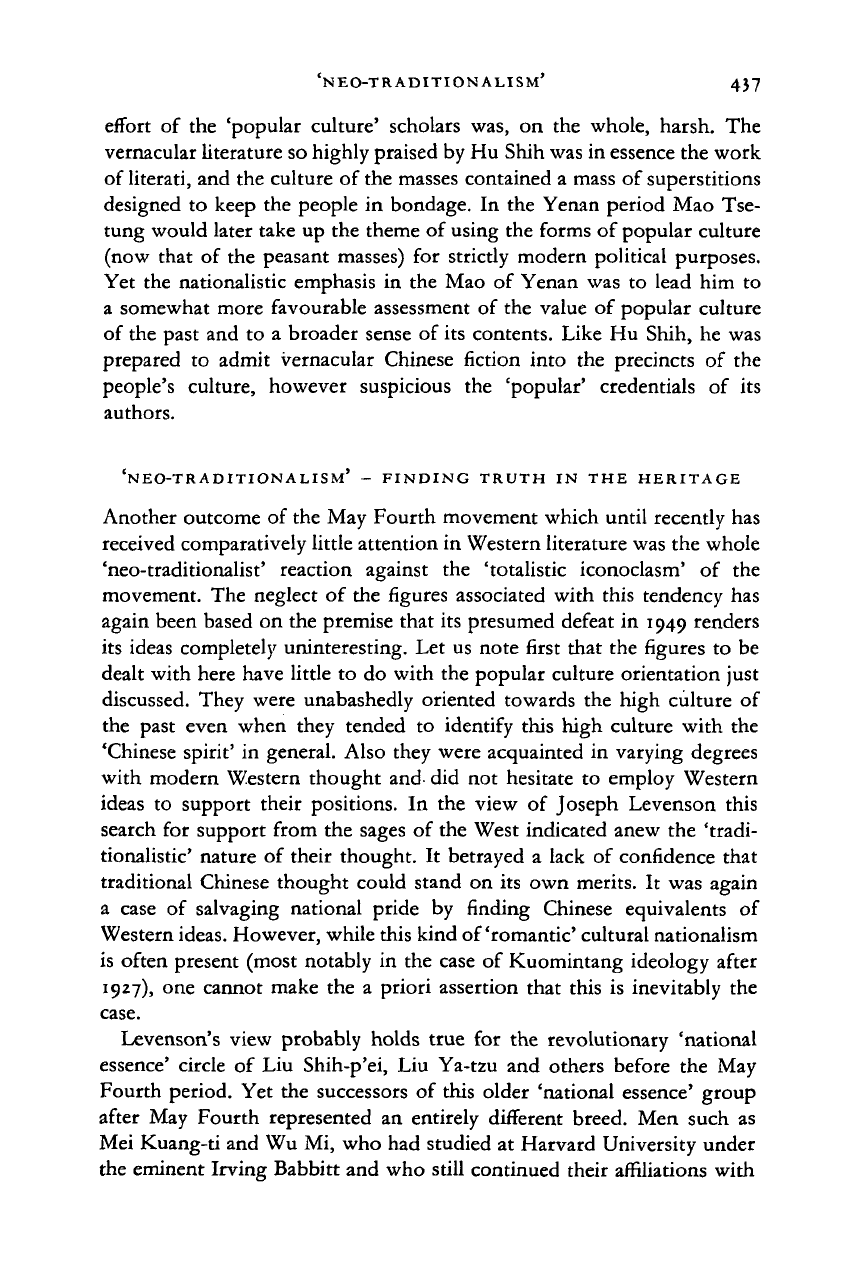
NEO-TRADITIONALISM 437
effort
of
the 'popular culture' scholars was,
on
the whole, harsh.
The
vernacular literature so highly praised by Hu Shih was in essence the work,
of literati, and the culture of the masses contained a mass of superstitions
designed
to
keep the people
in
bondage.
In
the Yenan period Mao Tse-
tung would later take up the theme of using the forms of popular culture
(now that
of
the peasant masses)
for
strictly modern political purposes.
Yet the nationalistic emphasis
in
the Mao
of
Yenan was
to
lead him
to
a somewhat more favourable assessment
of
the value
of
popular culture
of the past and
to a
broader sense of its contents. Like Hu Shih, he was
prepared
to
admit vernacular Chinese fiction into the precincts
of
the
people's culture, however suspicious
the
'popular' credentials
of its
authors.
NEO-TRADITIONALISM - FINDING TRUTH IN THE HERITAGE
Another outcome of the May Fourth movement which until recently has
received comparatively little attention in Western literature was the whole
'neo-traditionalist' reaction against
the
'totalistic iconoclasm'
of the
movement. The neglect
of
the figures associated with this tendency has
again been based on the premise that its presumed defeat in 1949 renders
its ideas completely uninteresting. Let us note first that the figures
to be
dealt with here have little
to
do with the popular culture orientation just
discussed. They were unabashedly oriented towards the high culture
of
the past even when they tended
to
identify this high culture with the
'Chinese spirit'
in
general. Also they were acquainted in varying degrees
with modern Western thought and- did not hesitate
to
employ Western
ideas
to
support their positions.
In
the view
of
Joseph Levenson this
search for support from the sages
of
the West indicated anew the 'tradi-
tionalistic' nature
of
their thought.
It
betrayed
a
lack
of
confidence that
traditional Chinese thought could stand on its own merits.
It
was again
a case
of
salvaging national pride
by
finding Chinese equivalents
of
Western
ideas.
However, while this kind of 'romantic' cultural nationalism
is often present (most notably
in
the case
of
Kuomintang ideology after
1927),
one cannot make the
a
priori assertion that this
is
inevitably the
case.
Levenson's view probably holds true
for
the revolutionary 'national
essence' circle
of
Liu Shih-p'ei, Liu Ya-tzu and others before
the
May
Fourth period. Yet the successors
of
this older 'national essence' group
after May Fourth represented
an
entirely different breed. Men such
as
Mei Kuang-ti and Wu Mi, who had studied at Harvard University under
the eminent Irving Babbitt and who still continued their affiliations with
Cambridge Histories Online © Cambridge University Press, 2008
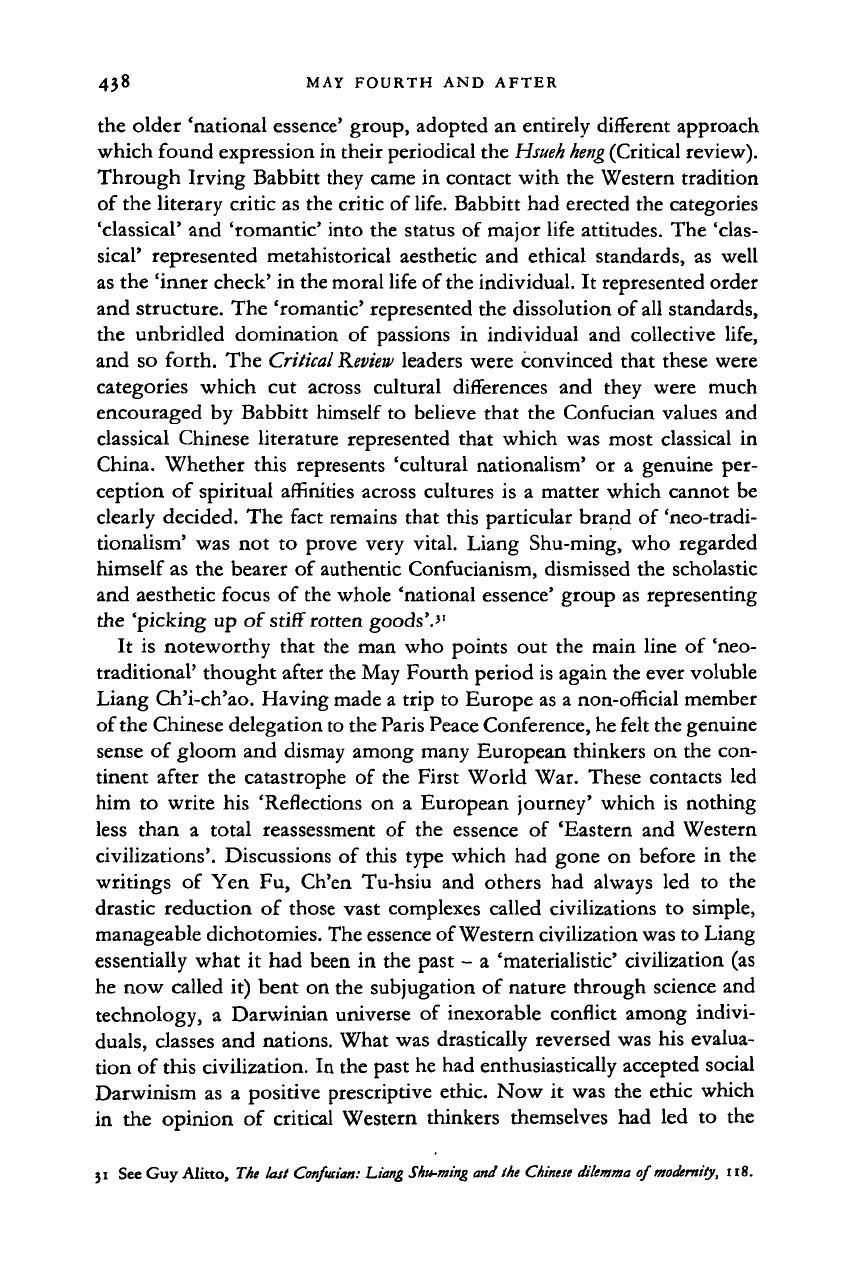
438 MAY FOURTH AND AFTER
the older 'national essence' group, adopted an entirely different approach
which found expression in their periodical the
Hsueh heng
(Critical review).
Through Irving Babbitt they came in contact with the Western tradition
of the literary critic as the critic of life. Babbitt had erected the categories
'classical' and 'romantic' into the status of major life attitudes. The 'clas-
sical' represented metahistorical aesthetic and ethical standards, as well
as the 'inner check' in the moral life of the individual. It represented order
and structure. The 'romantic' represented the dissolution of
all
standards,
the unbridled domination of passions in individual and collective life,
and so forth. The
Critical Review
leaders were convinced that these were
categories which cut across cultural differences and they were much
encouraged by Babbitt himself to believe that the Confucian values and
classical Chinese literature represented that which was most classical in
China. Whether this represents 'cultural nationalism' or a genuine per-
ception of spiritual affinities across cultures is a matter which cannot be
clearly decided. The fact remains that this particular brand of 'neo-tradi-
tionalism' was not to prove very vital. Liang Shu-ming, who regarded
himself as the bearer of authentic Confucianism, dismissed the scholastic
and aesthetic focus of the whole 'national essence' group as representing
the 'picking up of stiff rotten goods'.'
1
It is noteworthy that the man who points out the main line of 'neo-
traditional' thought after the May Fourth period is again the ever voluble
Liang Ch'i-ch'ao. Having made a trip to Europe as a non-official member
of the Chinese delegation to the Paris Peace Conference, he felt the genuine
sense of gloom and dismay among many European thinkers on the con-
tinent after the catastrophe of the First World War. These contacts led
him to write his 'Reflections on a European journey' which is nothing
less than a total reassessment of the essence of 'Eastern and Western
civilizations'. Discussions of this type which had gone on before in the
writings of Yen Fu, Ch'en Tu-hsiu and others had always led to the
drastic reduction of those vast complexes called civilizations to simple,
manageable dichotomies. The essence of Western civilization was to Liang
essentially what it had been in the past - a 'materialistic' civilization (as
he now called it) bent on the subjugation of nature through science and
technology, a Darwinian universe of inexorable conflict among indivi-
duals,
classes and nations. What was drastically reversed was his evalua-
tion of this civilization. In the past he had enthusiastically accepted social
Darwinism as a positive prescriptive ethic. Now it was the ethic which
in the opinion of critical Western thinkers themselves had led to the
51 See Guy Alitto, The last
Confucian:
Liang
Shu-ming
and
the Chinese dilemma
of modernity, 118.
Cambridge Histories Online © Cambridge University Press, 2008
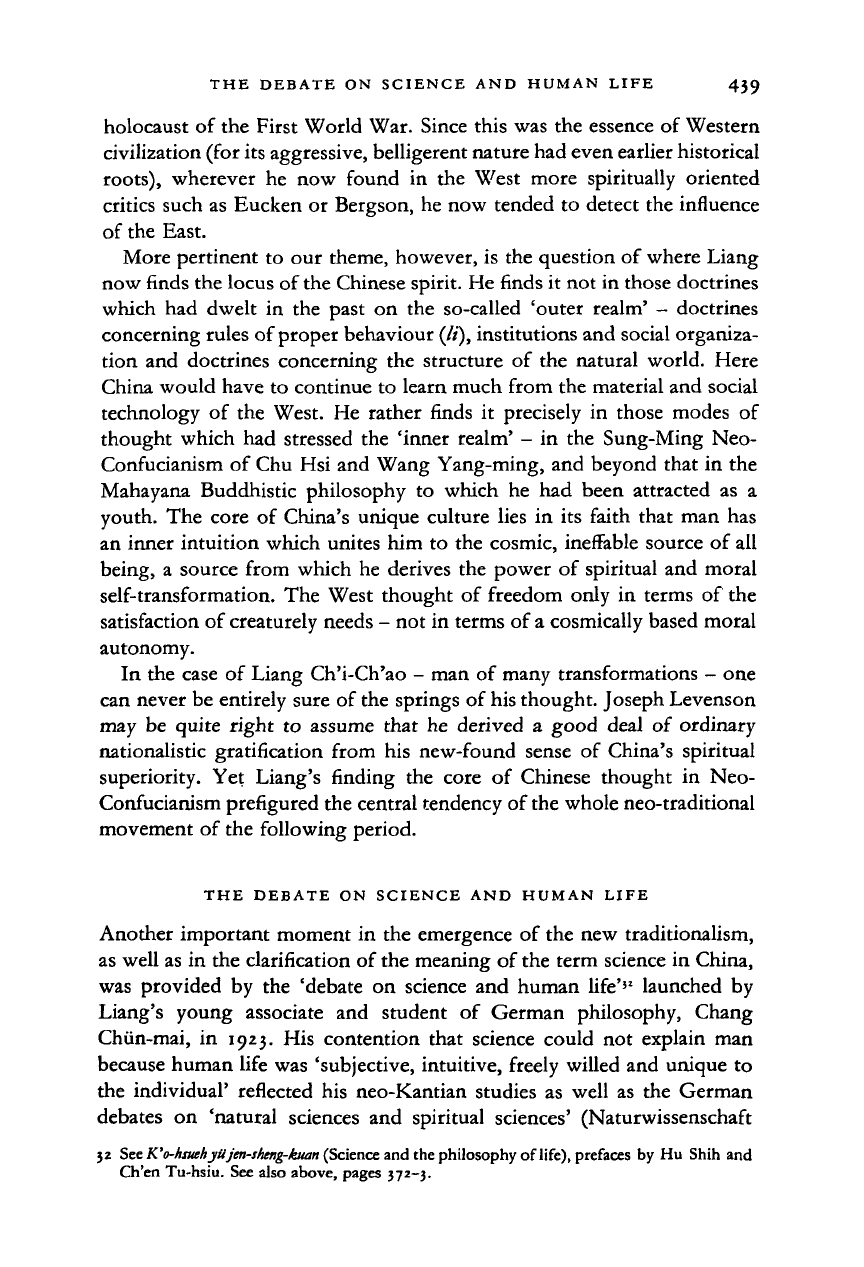
THE DEBATE ON SCIENCE AND HUMAN LIFE 439
holocaust
of
the First World War. Since this was
the
essence
of
Western
civilization (for its aggressive, belligerent nature had even earlier historical
roots),
wherever
he now
found
in the
West more spiritually oriented
critics such
as
Eucken
or
Bergson,
he
now tended
to
detect the influence
of the East.
More pertinent
to our
theme, however,
is
the question
of
where Liang
now finds the locus
of
the Chinese spirit.
He
finds
it
not
in
those doctrines
which
had
dwelt
in the
past
on the
so-called 'outer realm'
-
doctrines
concerning rules
of
proper behaviour (//), institutions and social organiza-
tion
and
doctrines concerning
the
structure
of the
natural world. Here
China would have
to
continue
to
learn much from the material and social
technology
of the
West.
He
rather finds
it
precisely
in
those modes
of
thought which
had
stressed
the
'inner realm'
- in the
Sung-Ming
Neo-
Confucianism
of
Chu
Hsi and
Wang Yang-ming,
and
beyond that
in the
Mahayana Buddhistic philosophy
to
which
he had
been attracted
as a
youth.
The
core
of
China's unique culture lies
in its
faith that
man has
an inner intuition which unites
him to the
cosmic, ineffable source
of
all
being,
a
source from which
he
derives
the
power
of
spiritual
and
moral
self-transformation.
The
West thought
of
freedom only
in
terms
of the
satisfaction
of
creaturely needs
-
not
in
terms
of
a cosmically based moral
autonomy.
In
the
case
of
Liang Ch'i-Ch'ao
-
man
of
many transformations
- one
can never
be
entirely sure
of
the springs
of
his thought. Joseph Levenson
may
be
quite right
to
assume that
he
derived
a
good deal
of
ordinary
nationalistic gratification from
his
new-found sense
of
China's spiritual
superiority.
Yet
Liang's finding
the
core
of
Chinese thought
in Neo-
Confucianism prefigured the central tendency
of
the whole neo-traditional
movement
of
the following period.
THE DEBATE ON SCIENCE AND HUMAN LIFE
Another important moment
in the
emergence
of
the
new
traditionalism,
as well as
in
the clarification
of
the meaning
of
the term science
in
China,
was provided
by the
'debate
on
science
and
human life''
2
launched
by
Liang's young associate
and
student
of
German philosophy, Chang
Chiin-mai,
in
1923.
His
contention that science could
not
explain
man
because human life was 'subjective, intuitive, freely willed
and
unique
to
the individual' reflected
his
neo-Kantian studies
as
well
as the
German
debates
on
'natural sciences
and
spiritual sciences' (Naturwissenschaft
32
SeeK'o-hsuehyiijen-sheng-kuan
(Scienceand the philosophy
of
life), prefaces
by Hu
Shih
and
Ch'en Tu-hsiu. See also above, pages 372-3.
Cambridge Histories Online © Cambridge University Press, 2008
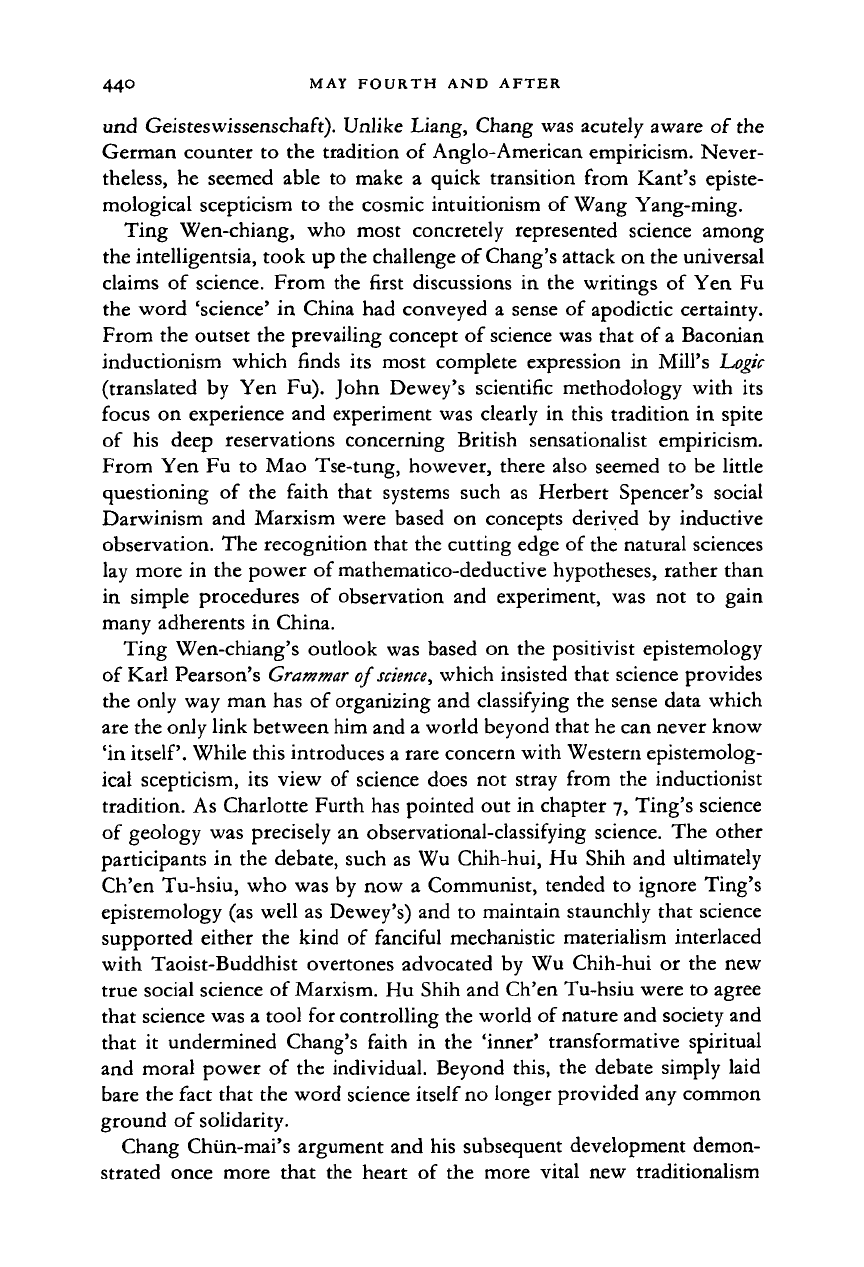
44O MAY FOURTH AND AFTER
und Geisteswissenschaft). Unlike Liang, Chang was acutely aware of the
German counter to the tradition of Anglo-American empiricism. Never-
theless, he seemed able to make a quick transition from Kant's episte-
mological scepticism to the cosmic intuitionism of Wang Yang-ming.
Ting Wen-chiang, who most concretely represented science among
the intelligentsia, took up the challenge of Chang's attack on the universal
claims of science. From the first discussions in the writings of Yen Fu
the word 'science' in China had conveyed a sense of apodictic certainty.
From the outset the prevailing concept of science was that of a Baconian
inductionism which finds its most complete expression in Mill's Logic
(translated by Yen Fu). John Dewey's scientific methodology with its
focus on experience and experiment was clearly in this tradition in spite
of his deep reservations concerning British sensationalist empiricism.
From Yen Fu to Mao Tse-tung, however, there also seemed to be little
questioning of the faith that systems such as Herbert Spencer's social
Darwinism and Marxism were based on concepts derived by inductive
observation. The recognition that the cutting edge of the natural sciences
lay more in the power of mathematico-deductive hypotheses, rather than
in simple procedures of observation and experiment, was not to gain
many adherents in China.
Ting Wen-chiang's outlook was based on the positivist epistemology
of Karl Pearson's
Grammar
of
science,
which insisted that science provides
the only way man has of organizing and classifying the sense data which
are the only link between him and a world beyond that he can never know
'in
itself.
While this introduces a rare concern with Western epistemolog-
ical scepticism, its view of science does not stray from the inductionist
tradition. As Charlotte Furth has pointed out in chapter 7, Ting's science
of geology was precisely an observational-classifying science. The other
participants in the debate, such as Wu Chih-hui, Hu Shih and ultimately
Ch'en Tu-hsiu, who was by now a Communist, tended to ignore Ting's
epistemology (as well as Dewey's) and to maintain staunchly that science
supported either the kind of fanciful mechanistic materialism interlaced
with Taoist-Buddhist overtones advocated by Wu Chih-hui or the new
true social science of Marxism. Hu Shih and Ch'en Tu-hsiu were to agree
that science was a tool for controlling the world of nature and society and
that it undermined Chang's faith in the 'inner' transformative spiritual
and moral power of the individual. Beyond this, the debate simply laid
bare the fact that the word science itself no longer provided any common
ground of solidarity.
Chang Chun-mai's argument and his subsequent development demon-
strated once more that the heart of the more vital new traditionalism
Cambridge Histories Online © Cambridge University Press, 2008
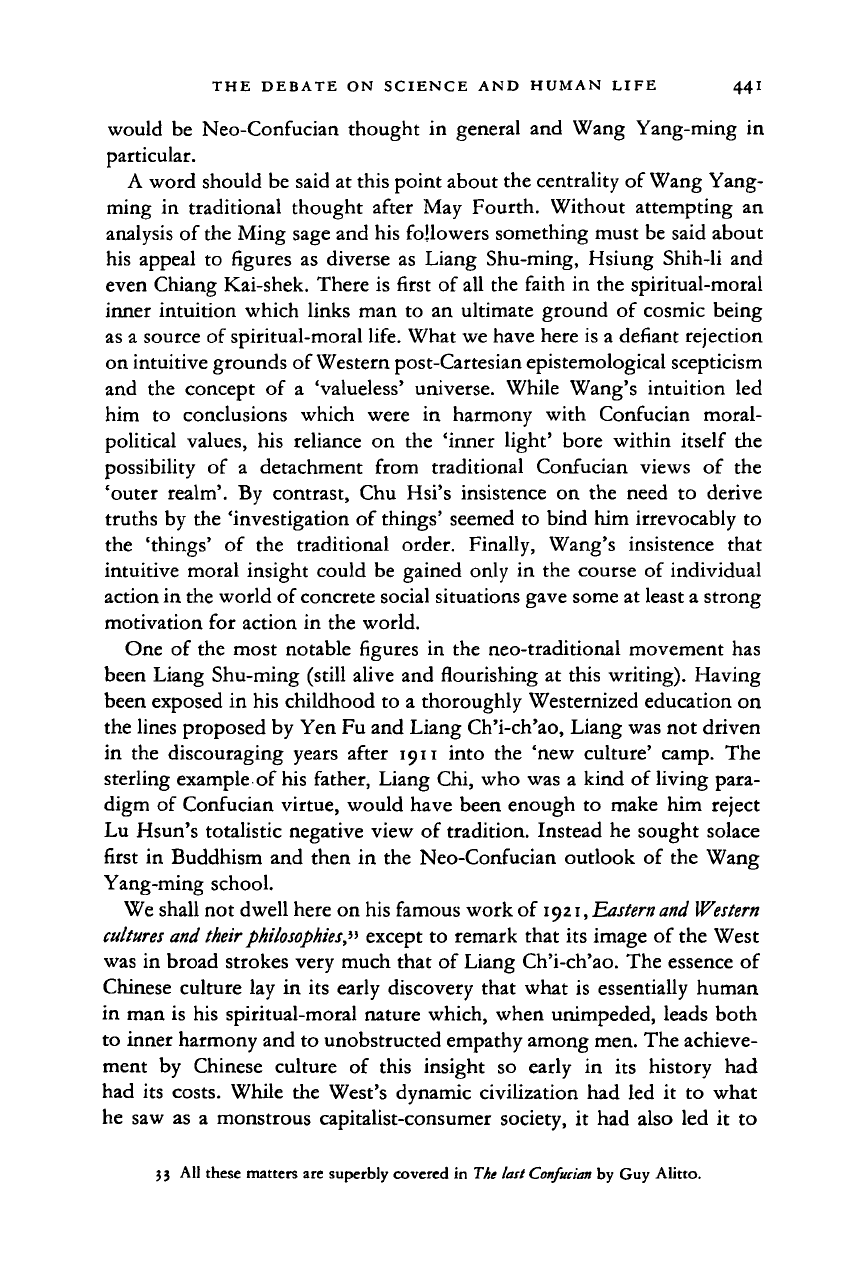
THE DEBATE ON SCIENCE AND HUMAN LIFE 441
would
be
Neo-Confucian thought
in
general
and
Wang Yang-ming
in
particular.
A word should
be
said
at
this point about the centrality
of
Wang Yang-
ming
in
traditional thought after
May
Fourth. Without attempting
an
analysis
of
the Ming sage and his followers something must be said about
his appeal
to
figures
as
diverse
as
Liang Shu-ming, Hsiung Shih-li
and
even Chiang Kai-shek. There
is
first
of
all
the
faith
in the
spiritual-moral
inner intuition which links
man to an
ultimate ground
of
cosmic being
as
a
source
of
spiritual-moral life. What we have here
is a
defiant rejection
on intuitive grounds
of
Western post-Cartesian epistemological scepticism
and
the
concept
of a
'valueless' universe. While Wang's intuition
led
him
to
conclusions which were
in
harmony with Confucian moral-
political values,
his
reliance
on the
'inner light' bore within itself
the
possibility
of a
detachment from traditional Confucian views
of the
'outer realm'.
By
contrast,
Chu
Hsi's insistence
on the
need
to
derive
truths
by the
'investigation
of
things' seemed
to
bind him irrevocably
to
the 'things'
of the
traditional order. Finally, Wang's insistence that
intuitive moral insight could
be
gained only
in the
course
of
individual
action in the world
of
concrete social situations gave some
at
least a strong
motivation
for
action
in the
world.
One
of the
most notable figures
in the
neo-traditional movement
has
been Liang Shu-ming (still alive
and
flourishing
at
this writing). Having
been exposed
in
his childhood
to a
thoroughly Westernized education
on
the lines proposed
by
Yen
Fu
and Liang Ch'i-ch'ao, Liang was
not
driven
in
the
discouraging years after
1911
into
the 'new
culture' camp.
The
sterling example
of
his father, Liang Chi, who was
a
kind
of
living para-
digm
of
Confucian virtue, would have been enough
to
make
him
reject
Lu Hsun's totalistic negative view
of
tradition. Instead
he
sought solace
first in Buddhism
and
then
in the
Neo-Confucian outlook
of the
Wang
Yang-ming school.
We shall not dwell here
on
his famous work
of
1921,
Eastern and Western
cultures and
their
philosophies,^
except
to
remark that
its
image
of
the West
was
in
broad strokes very much that
of
Liang Ch'i-ch'ao. The essence
of
Chinese culture
lay in its
early discovery that what
is
essentially human
in man
is his
spiritual-moral nature which, when unimpeded, leads both
to inner harmony and
to
unobstructed empathy among men. The achieve-
ment
by
Chinese culture
of
this insight
so
early
in its
history
had
had
its
costs. While
the
West's dynamic civilization
had led it to
what
he
saw as a
monstrous capitalist-consumer society,
it had
also
led it to
53
All
these matters are superbly covered
in
The
last
Confucian
by Guy
Alitto.
Cambridge Histories Online © Cambridge University Press, 2008
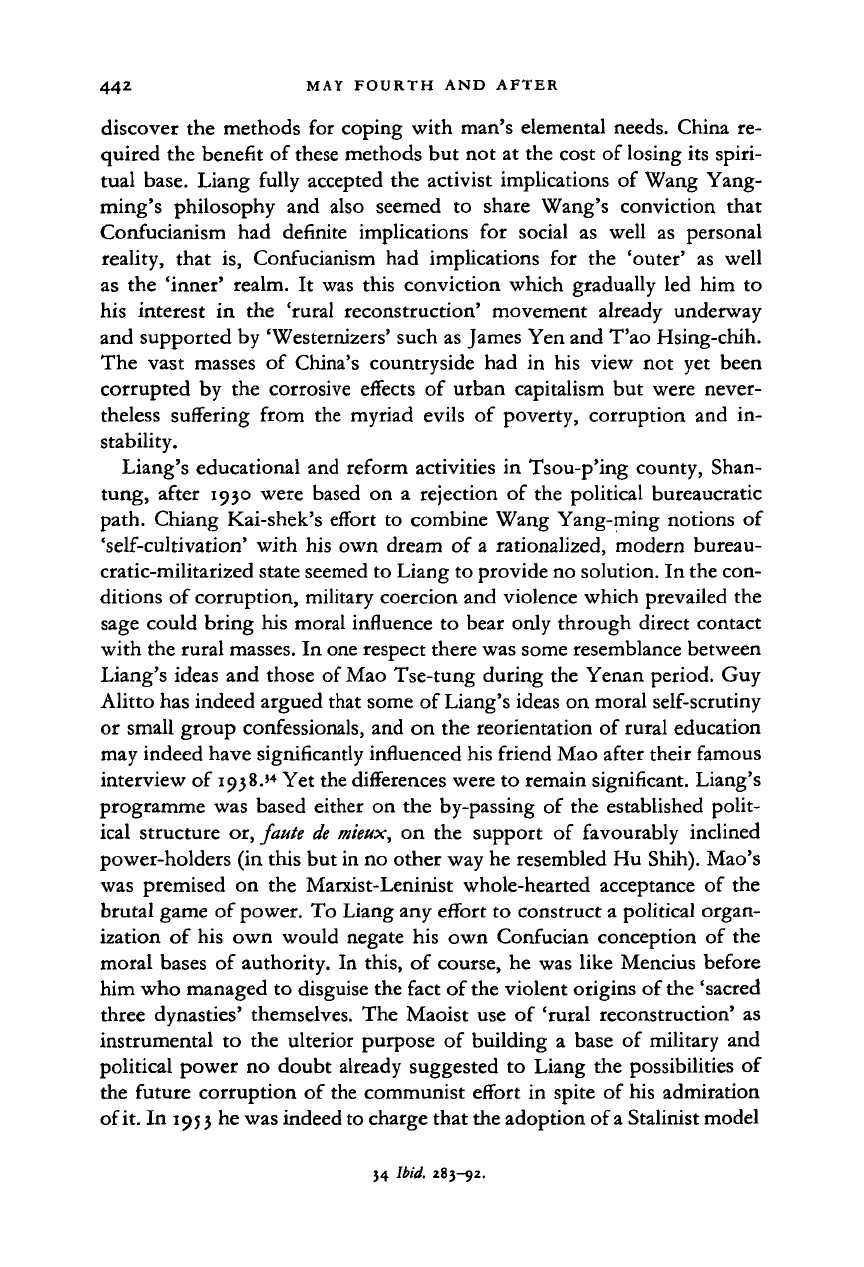
442 MAY FOURTH AND AFTER
discover the methods for coping with man's elemental needs. China re-
quired the benefit of these methods but not at the cost of losing its spiri-
tual base. Liang fully accepted the activist implications of Wang Yang-
ming's philosophy and also seemed to share Wang's conviction that
Confucianism had definite implications for social as well as personal
reality, that is, Confucianism had implications for the 'outer' as well
as the 'inner' realm. It was this conviction which gradually led him to
his interest in the 'rural reconstruction' movement already underway
and supported by 'Westemi2ers' such as James Yen and T'ao Hsing-chih.
The vast masses of China's countryside had in his view not yet been
corrupted by the corrosive effects of urban capitalism but were never-
theless suffering from the myriad evils of poverty, corruption and in-
stability.
Liang's educational and reform activities in Tsou-p'ing county, Shan-
tung, after 1930 were based on a rejection of the political bureaucratic
path. Chiang Kai-shek's effort to combine Wang Yang-ming notions of
'self-cultivation' with his own dream of a rationalized, modern bureau-
cratic-militarized state seemed to Liang to provide no solution. In the con-
ditions of corruption, military coercion and violence which prevailed the
sage could bring his moral influence to bear only through direct contact
with the rural masses. In one respect there was some resemblance between
Liang's ideas and those of Mao Tse-tung during the Yenan period. Guy
Alitto has indeed argued that some of Liang's ideas on moral self-scrutiny
or small group confessionals, and on the reorientation of rural education
may indeed have significantly influenced his friend Mao after their famous
interview of 193 8.'
4
Yet the differences were to remain significant. Liang's
programme was based either on the by-passing of the established polit-
ical structure or, faute de mieux, on the support of favourably inclined
power-holders (in this but in no other way he resembled Hu Shih). Mao's
was premised on the Marxist-Leninist whole-hearted acceptance of the
brutal game of power. To Liang any effort to construct a political organ-
ization of his own would negate his own Confucian conception of the
moral bases of authority. In this, of course, he was like Mencius before
him who managed to disguise the fact of the violent origins of the 'sacred
three dynasties' themselves. The Maoist use of 'rural reconstruction' as
instrumental to the ulterior purpose of building a base of military and
political power no doubt already suggested to Liang the possibilities of
the future corruption of the communist effort in spite of his admiration
of it. In
195 3
he was indeed to charge that the adoption of a Stalinist model
34
Ibid.
285-92.
Cambridge Histories Online © Cambridge University Press, 2008
